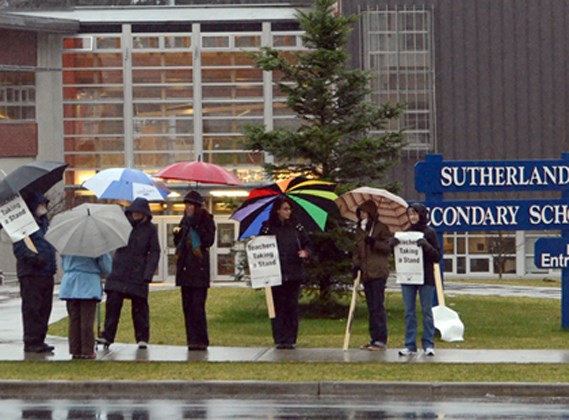Teachers across the province voted overwhelmingly in favour of strike action this week, with 89 per cent of teachers voting yes to a possible strike.
B.C. Teachers Federation President Jim Iker and other union representatives said there will be no immediate action taken.
"Nobody's going to show up for school and see pickets," said Daniel Storms, president of the North Vancouver Teachers Association, which represents 1,200 members.
Teachers have 90 days from the strike vote to start some kind job action. Storms said if progress isn't made at the bargaining table, initial moves are likely to involve teachers refusing to do administrative work like taking part in staff meetings.
"The average parent or student isn't even going to notice that," he said.
But teachers also raised the possibility of rotating district-by-district strikes later on.
"It's predicated on what's going on at the table," said Storms.
"We're hoping we have an agreement and we don't have to do anything."
Franci Stratton, chairwoman of the North Vancouver Board of Education, said the district remains hopeful that a negotiated settlement will be reached without a strike.
So far Education
Minister Peter Fassbender has said the province is still seeking a 10-year deal - something teachers have rejected. The province has
offered teachers a wage deal that includes a 6.5 per cent increase over the first six years.
Teachers have said they are asking for a costof-living increase, plus additional increases to put them on a similar pay scale to what teachers make in other provinces.
Starting teachers on the North Shore make about $45,000, while teachers with 10 years' experience and a master's degree make anywhere from $74,000 in West Vancouver to $82,000 in North Vancouver. Storms said teachers in Ontario make about $10,000 more than that and teachers in Alberta make $20,000 more.
Rob Millard, president of the West Vancouver Teachers Association, which represents about 550 teachers, said teachers gave up salary increases a decade ago in order to get better working conditions including agreements about class size and composition. But the government later ripped up that part of the agreement, prompting a decade-long court battle. Teachers recently won that case, but the province has appealed.
Meanwhile, talks continued at the bargaining table on Friday.



